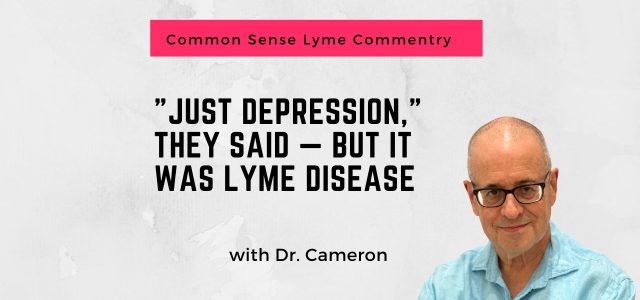
After 37 years treating Lyme disease, I’ve seen psychiatric misdiagnosis delay treatment for years. A woman came to my office after seeing three different doctors. Each time, she heard the same thing: “You’re probably just depressed.” But her symptoms told a different story—one that pointed to Lyme disease, not mental illness.
When the Diagnosis Doesn’t Tell the Whole Story
Depression is serious. But it’s not the explanation for every symptom a patient experiences.
By the time this patient found me, her symptoms extended beyond mood:
- Overwhelming fatigue
- Unpredictable joint pain
- Cloudy thinking and memory problems that felt frightening
She wasn’t just sad or withdrawn. She was physically sick — and she knew it. Still, because she had a history of depression, her new symptoms were brushed aside.
Nobody asked about the pattern of her pain. Nobody noticed how it migrated from joint to joint. Nobody questioned why sleep didn’t restore her energy. Nobody considered that this could be Lyme disease.
What Happens When We Stop Asking Questions
I see this pattern repeatedly. Once a label like “depression” is placed on a patient’s chart, everything that follows gets filtered through that lens.
Headaches become stress. Fatigue becomes depression. Brain fog becomes anxiety.
But medicine requires curiosity. We must ask: “What else could be going on?”
When I sat down and listened to her full story, it was clear her symptoms didn’t fit neatly into a mental health diagnosis. They fluctuated, migrated, and worsened unpredictably — patterns we see with infection and inflammation, not simply mood disorders.
So we dug deeper. I ordered testing for Lyme disease. We found it.
Why Lyme Disease Is Missed
One of the reasons Lyme disease is so often missed is because it doesn’t always look the way doctors are trained to recognize it. No obvious tick bite. No bull’s-eye rash. No early flu-like illness.
Instead, it can look like:
- Depression
- Anxiety
- Chronic fatigue
- Cognitive decline
- Mood swings
- Brain fog
Because Lyme can affect the immune system, nervous system, joints, and brain, it creates a complicated picture that’s easy to misread — especially when doctors stop asking questions.
Other Mental Health Misdiagnoses
Depression isn’t the only diagnosis that can mask Lyme disease. I’ve also seen patients misdiagnosed with:
- Anxiety disorders
- Panic attacks
- Bipolar disorder
- Obsessive-compulsive disorder (OCD)
- Somatic symptom disorder (told “it’s all in your head”)
- Post-traumatic stress disorder (PTSD)
These are serious conditions. But Lyme disease can mimic many of their symptoms, including emotional instability, irritability, panic episodes, severe fatigue, and cognitive slowing.
When we anchor too quickly to a psychiatric explanation, we can miss a medical illness that is still active — and still treatable.
Treatment Changed Everything
When I treated her Lyme disease, her health started to return:
- Her energy came back
- Her brain fog lifted
- Her joint pain improved
- Her mood stabilized — not because she changed medications, but because her infection was finally being treated
She began feeling like herself again — regaining not just her physical strength, but her mental clarity and emotional resilience too.
Frequently Asked Questions
Can Lyme disease cause depression?
Yes. Lyme disease causes depression through brain inflammation and includes physical symptoms like joint pain and severe fatigue that may improve with antibiotic treatment.
How is Lyme disease depression different from primary depression?
Lyme depression includes unexplained physical symptoms — migrating joint pain, severe fatigue, brain fog — that fluctuate unpredictably and resist standard antidepressants.
Should depressed patients be tested for Lyme disease?
Testing should be considered when depression includes unexplained physical symptoms, outdoor exposure history, or resistance to standard treatment.
Related Reading
Lyme Disease Misdiagnosis: Why It Happens and What Patients Need to Know
Suicidal Behaviors in Patients with Lyme Disease
16-Year-Old Boy with Lyme Disease Presenting as Depression



How do you get tested for this
I advise my patients to consult a doctor experienced in treating the neurologic and neuropsychiatric manifestations of Lyme disease.
C’est l’enfer depuis 20 ans, et en France l’accueil est de pire en pire !
google – It’s been hell for 20 years, and in France the treatment is getting worse and worse
Too depressed and tired to even write my story. Nobody will listen. Actually I don’t think the doctors know anything anyway. I have been checked and no signs. I am a Forester and retired combat veteran. Highly exposed and have removed many ticks. You’re good!
I hope you find your heath again